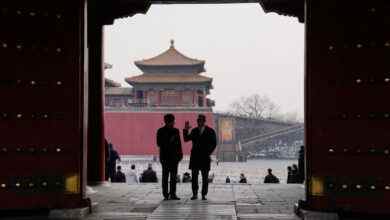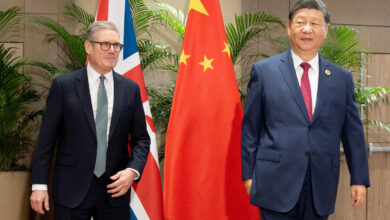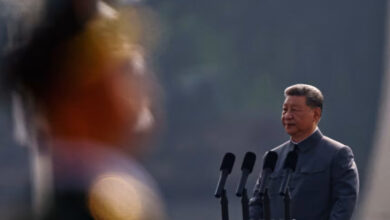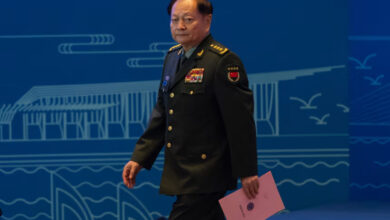Beijing/Tokyo–Chinese state media blasted the United States on Monday for a planned US$6.4 billion arms package for Taiwan, while a US official said Washington was committed to helping the island defend itself.
The arms sales, the latest in a series but the first by the Obama administration, has added to a litany of bilateral strains between the world’s biggest and third-biggest economies, including the value of China’s currency, trade protectionism, internet freedoms and Tibet.
The official China Daily said US weapons sales to the self-ruled island, which China claims as its own, "inevitably cast a long shadow on Sino-US relations."
"China’s response, no matter how vehement, is justified. No country worthy of respect can sit idle while its national security is endangered and core interests damaged," the English-language newspaper said in an editorial.
The United States switched diplomatic recognition from Taipei to Beijing in 1979, recognizing "one China," and says it wants the two sides to settle their differences peacefully. The United States remains Taiwan’s biggest backer and is obliged by the 1979 Taiwan Relations Act to help in the island’s defense.
US Assistant Secretary of Defense for the Asia-Pacific Wallace Gregson said Washington aimed to maintain cooperative, cordial relations with China but would not abandon Taiwan.
"The United States is also obligated to ensure Taiwan’s self-defense capability and the United States fully intends to meet every one of our obligations there and we will continue to do so into the future," he said in Tokyo.
Beijing considers Taiwan a breakaway province that must accept eventual unification, by force if necessary. China’s ruling Communist Party controls the country’s media and uses them at sensitive times to amplify its message.
Reflecting intense emotions over the arms sales, Chinese Internet users vented anger with calls to boycott top US exporter Boeing and other companies supplying parts.
China has for years opposed US defense sales to Taiwan, which has been separated from mainland rule since 1949 and from 1895 to 1945 was a Japanese colony.
For the first time, however, Beijing sought to pressure the United States by threatening to formally punish companies whose arms are involved in the arms package, which was announced on Friday.
"China has no room whatever for compromise on this issue," said a commentary in the Liberation Army Daily, the mouthpiece of the country’s military, adding that Chinese armed forces were ready for "resolute struggle" over Taiwan.
"It is entirely reasonable to impose corresponding sanctions on U.S. companies involved in arms sales to Taiwan."
Chinese shares appeared unmoved, but trading in offshore one-year dollar/yuan non-deliverable forwards (NDFs) implied slightly slower appreciation for the yuan over the next 12 months.
Dealers said the NDFs’ shift was mainly driven by the dollar’s global strength, but the Sino-U.S. tension also contributed to the rise.
So far, China’s top leaders, President Hu Jintao and Premier Wen Jiabao, have not publicly commented on what they have said is their nation’s top-most issue, suggesting they want to keep some leeway in dealing with Washington.
Despite Beijing’s strident words, options for punishing the United States were limited, said Drew Thompson, Director of China Studies and Starr Senior Fellow at the Nixon Center, a think tank in Washington, D.C.
"They don’t have a lot of leverage, and that’s a source of frustration for them," he said. "It’s hard to picture what they could do that’s anything other than symbolic."
Sanctions on plane-maker Boeing Co could give its rival Airbus more leverage in negotiations with Chinese buyers, said Thompson.
US officials have said Taiwan, which lags China in the balance of military power, needs updated weapons to give it more sway with Beijing, which Taiwan says has more than 1400 short- and mid-range missiles aimed at the island.
Beijing would postpone or partially halt some military contacts with the United States, including visits planned for this year, including one by US Defense Secretary Robert Gates, and meetings between top military commanders, Xinhua news agency said.
China also said the dispute will damage cooperation with the US over international issues. Washington has sought stronger Chinese support over several international hotspots, chiefly the nuclear ambitions of Iran and North Korea.
Beijing could show its anger by delaying or downgrading negotiations on Iran, but is unlikely to abandon its long-established stance of nudging Tehran to cooperate while resisting heavy sanctions on the big oil supplier.
"It’s difficult to take what are global problems and use them as a tool to vent frustration over a bilateral issue," Thompson, the Washington-based researcher, said of China’s options. "They risk isolating themselves pretty badly."




